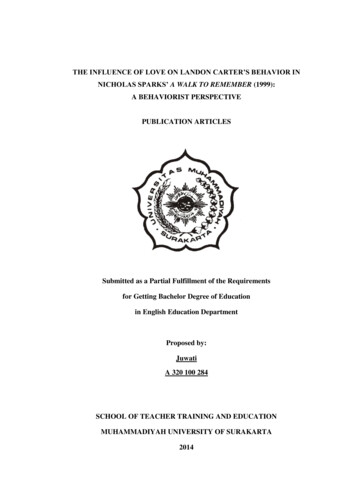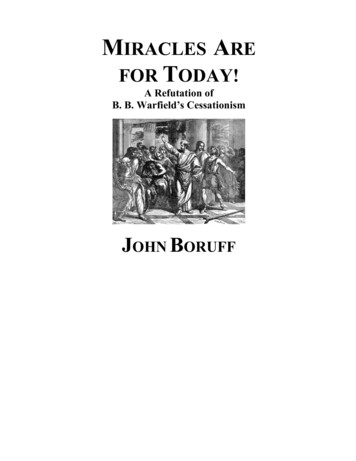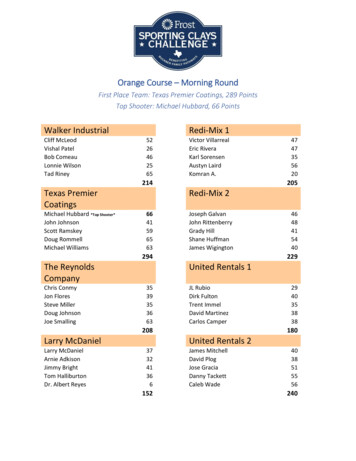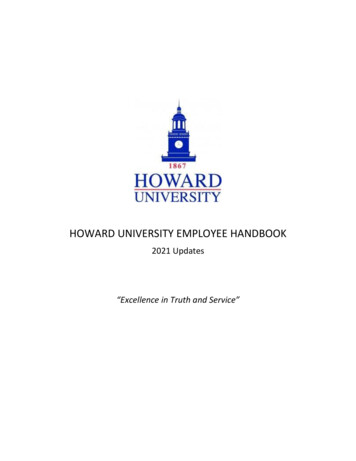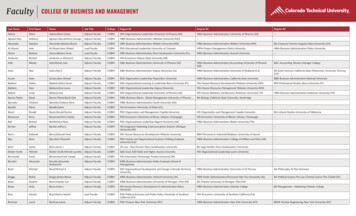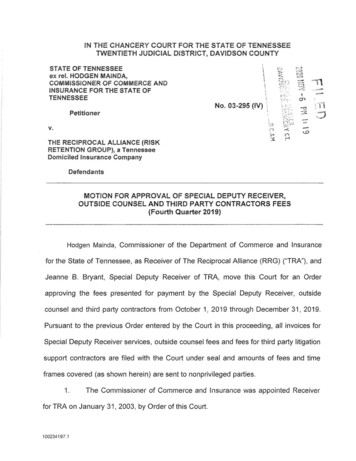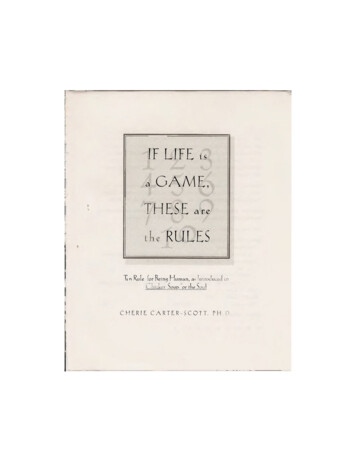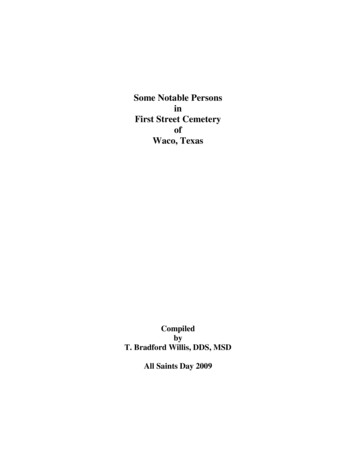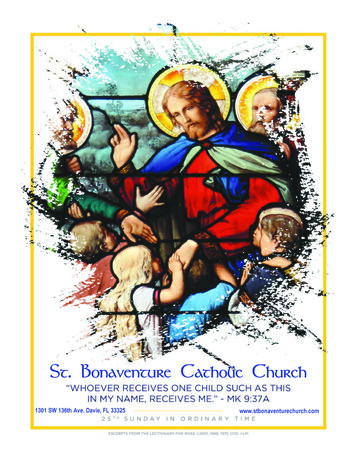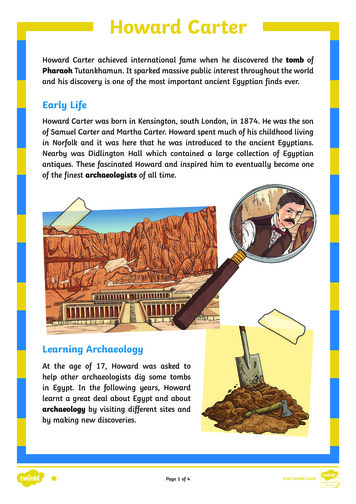
Transcription
Howard CarterHoward Carter achieved international fame when he discovered the tomb ofPharaoh Tutankhamun. It sparked massive public interest throughout the worldand his discovery is one of the most important ancient Egyptian finds ever.Early LifeHoward Carter was born in Kensington, south London, in 1874. He was the sonof Samuel Carter and Martha Carter. Howard spent much of his childhood livingin Norfolk and it was here that he was introduced to the ancient Egyptians.Nearby was Didlington Hall which contained a large collection of Egyptianantiques. These fascinated Howard and inspired him to eventually become oneof the finest archaeologists of all time.Learning ArchaeologyAt the age of 17, Howard was asked tohelp other archaeologists dig some tombsin Egypt. In the following years, Howardlearnt a great deal about Egypt and aboutarchaeology by visiting different sites andby making new discoveries.Page 1 of 4visit twinkl.com
Howard CarterThe DiscoveryWhat did Howard Carter discover inside thetomb of Tutankhamun?Over 3,000 treasures were found.Who was Tutankhamun?Tutankhamun was an Egyptian pharaoh ofthe 18th dynasty. He is sometimes known as‘King Tut’. He had been resting in his tombfor over 3,000 years before Howard Carterdiscovered him.What do we know about him?He was Pharaoh for only nine years and hewas around 18 when he died.Page 2 of 4visit twinkl.com
Howard CarterHis Amazing DiscoveryIn 1922, a wealthy man called Lord Carnarvonasked Howard to join him on an important dig. Itwas at a place known as the Valley of the Kingsand it was here that Howard made his discovery.On the 26th November that year, Howarddiscovered the tomb of Tutankhamun – the boyking of ancient Egypt. Most of the Pharaoh’streasures were still in place, untouched forthousands of years.A few weeks later, Howard managed to reach into the next section of the tomb.Here lay the sarcophagus of ‘King Tut’ himself.Later LifeThe treasures found in King Tutankhamun’stomb are still considered the best preservedand the most complete ever to be found in theValley of the Kings. Its discovery was hot newsat the time and it made Howard very famous.After this discovery, Howard decided to retirefrom archaeology and he worked for collectorsand for museums. In 1924, he visited differentcountries and he gave talks about the treasureshe had found and what it had been like todiscover King Tut’s tomb.On 2nd March 1939, Howard Carter passed away. The wordson his tombstone read: ‘May your spirit live, may you spendmillions of years, you who love Thebes, sitting with your faceto the north wind, your eyes beholding happiness.’ This is aquotation borrowed from the Wishing Cup of Tutankhamun –one of the amazing treasures that he discovered on that specialday in 1922.Page 3 of 4visit twinkl.com
Howard CarterGlossaryarchaeologist: Someone who studies history by digging upsites in order to find buried remains.archaeology: The study of history by digging up sites to findburied remains.pharaoh: A ruler of ancient Egypt.sarcophagus: A stone coffin.tomb: A large room, usually underground, used for buryingsomeone when they have died.Page 4 of 4visit twinkl.com
QuestionsHoward Carter1. Who was Howard Carter’s father? Tick one. TutankhamunLord CarnarvonSamuelMartha2. Draw three lines and match each event to the year that it happened.Howard visited othercountries to give talks.1874Howard was born.1922Howard discovered KingTutankhamun’s tomb.1924 3. What was King Tutankhamun also sometimes known as? 4. What is the name of the place that inspired Howard ‘to become one of the finestarchaeologists of all time,’ when he was young? 5. ‘The treasures found in King Tutankhamun’s tomb are still considered the best preservedand most complete ever to be found.’ What other word or phrase could be used instead of‘preserved’? Page 1 of 2visit twinkl.com
Howard Carter6. ‘On 26th November 1922, Howard discovered the tomb of Tutankhamun.’ How do youthink this made Howard feel? Explain your answer. 7. Howard chose the following words to be on his tombstone: ‘May your spirit live, mayyou spend millions of years, you who love Thebes, sitting with your face to the northwind, your eyes beholding happiness.’ Why do you think he chose these words? 8. Imagine you are Howard Carter when he was a young boy. Write a short letter about whatyou want to achieve in life. Page 2 of 2visit twinkl.com
AnswersHoward Carter1. Who was Howard Carter’s father? Tick one. TutankhamunLord CarnarvonSamuelMartha2. Draw three lines and match each event to the year that it happened.Howard visited othercountries to give talks.1874Howard was born.1922Howard discovered KingTutankhamun’s tomb.1924 3. What was King Tutankhamun also sometimes known as? King Tutankhamun was also known as King Tut (also accept ‘Boy King’).4. What is the name of the place that inspired Howard ‘to become one of the finest archaeologistsof all time,’ when he was young?The place that inspired Howard ‘to become one of the finest archaeologists of all time,’was called Didlington Hall.5. ‘The treasures found in King Tutankhamun’s tomb are still considered the best preservedand most complete ever to be found.’ What other word or phrase could be used instead of‘preserved’? Pupils’ own responses, such as: ‘conserved’, ‘protected’, ‘saved’, ‘well looked after’.Page 1 of 2visit twinkl.com
Howard Carter6. ‘On 26th November 1922, Howard discovered the tomb of Tutankhamun.’ How do youthink this made Howard feel? Explain your answer.Pupils’ own responses, such as: ‘I think Howard would have felt really pleased thathe discovered the treasure. He was an archaeologist and this was what he wantedto achieve. He would have felt tremendous satisfaction and he would have been veryproud.’7. Howard chose the following words to be on his tombstone: ‘May your spirit live, mayyou spend millions of years, you who love Thebes, sitting with your face to the northwind, your eyes beholding happiness.’ Why do you think he chose these words?Pupils’ own responses, such as: ‘The words were taken from one of Tutankhamun’streasures, which sums up Howard’s life because he was known around the world fordiscovering them. He loved anything to do with ancient Egypt and especially digging uppharaohs’ tombs. To have something like this on his own tombstone is rather fitting.’8. Imagine you are Howard Carter when he was a young boy. Write a short letter about whatyou want to achieve in life.Pupils’ own responses, such as: ‘I love all the Egyptian antiques in Didlington Hall; Ithink they are really special. I would love to have been the person who discovered themburied in a pharaoh’s tomb. When I’m older, I want to discover secrets of mummies andpharaohs and learn all about the ancient Egyptians. I want to be an archaeologist.’Page 2 of 2visit twinkl.com
Howard CarterHoward Carter achieved international fame when he discovered the tomb ofPharaoh Tutankhamun in November 1922. Funded by Lord Carnarvon, Howard’sfind sparked massive public interest throughout the world. His discovery is oneof the most important ancient Egyptian finds ever.Early LifeBorn in Kensington in 1874, Howard Carter was the son of the artist SamuelCarter and Martha Carter. He spent much of his childhood living in Norfolk andit was here that Howard got his first taste of the ancient Egyptians. Nearbywas Didlington Hall – owned by the wealthy Amherst family – where a largecollection of Egyptian antiques could be found. This fascinated Howard, ignitingan interest that would lead him to become arguably Britain’s most celebratedarchaeologist of all time.Being an ArchaeologistIn 1891, at the age of 17, the Egypt Exploration Fund (EEF) asked Howard tohelp them in the excavation of the Middle Kingdom tombs at Beni Hasan.In the following years, Howard worked under many renowned archaeologistsand he learnt a great deal from them.Within eight years, Howard became Chief Inspector of the Egyptian AntiquitiesService (EAS). Within this role, he supervised excavations at many ancientEgyptian sites.Page 1 of 4visit twinkl.com
Howard CarterHis Amazing DiscoveryIn 1922, Lord Carnarvon – a wealthy man with an interest in Egyptology –asked Howard to join him on an important excavation at the west banks of theRiver Nile, near Thebes. The area was known as the Valley of the Kings and itwas here that Howard made his discovery.On 26th November 1922, after weeks of excavating, Howard discovered the tombof Tutankhamun – the fabled boy king of ancient Egypt. Most of the Pharaoh’streasures were still in place, untouched for thousands of years.A few weeks later, Howard managed to reachinto the next section of the tomb. Here lay thesarcophagus of ‘King Tut’ himself.King Tutankhamun’s sarcophagus is stillconsidered the best preserved and the mostcomplete ever to be found in the Valley of theKings; its discovery was hot news at the time.Later LifeOnce the clearance of the tomb was complete, Howard decided to retire fromarchaeology and he worked for collectors and for museums. In 1924, he visiteddifferent countries giving lectures about his incredible discovery.On 2nd March 1939, aged 64,Howard Carter passed awayand his body was laid to rest.Even then, his love for ancientEgypt remained strong. Hisepitaph reads: ‘May your spiritlive, may you spend millionsof years, you who love Thebes,sitting with your face to thenorth wind, your eyes beholdinghappiness.’ This is a quotationborrowed from the Wishing Cupof Tutankhamun – one of theamazing treasures he discoveredon that special day in 1922.Page 2 of 4visit twinkl.com
Howard CarterThe DiscoveryWhat did Howard Carter discover inside thetomb of Tutankhamun?Over 3,000 treasures were found in Tutankhamun’stomb. There were also pictures of his voyage in theafterworld painted all over the walls.Who was Tutankhamun?Tutankhamun was an Egyptian pharaoh of the18th dynasty. He is sometimes known as ‘KingTut’. He had been resting in his tomb for over3000 years before Howard Carter discoveredhim.What do we know about him?He was Pharaoh for only nine years and hewas approximately 18 when he died.Page 3 of 4visit twinkl.com
Howard CarterGlossaryarchaeologist: Someone who studies history through theexcavation of sites.epitaph: Words written, often on a tombstone, in memory of aperson who has died.excavation: A site that has been dug through the carefulremoval of earth in order to find buried remains.sarcophagus: A stone coffin.Page 4 of 4visit twinkl.com
QuestionsHoward Carter1. Who provided the money for Howard Carter’s ‘important’ ancient Egyptian discovery? Tickone. Howard CarterSamuel CarterSamuel Carter and Martha CarterLord Carnarvon2. ‘This fascinated Howard, igniting an interest that would lead him to become arguablyBritain’s most celebrated archaeologist of all time.’ What word could be used instead of‘igniting’? 3. What did Howard Carter become, eight years after he arrived in Egypt, in 1891? 4. What was King Tutankhamun also sometimes known as? 5. Summarise what Howard Carter’s ‘amazing discovery’ was. Give two or three pieces ofinformation in your answer. 6. How do you think that discovering Tutankhamun’s tomb made Howard feel? Explain youranswer. Page 1 of 2visit twinkl.com
Howard Carter7. Why do you think Howard decided to retire from archaeology? Think of at least two reasons. 8. Think of two ways in which the stories of Howard Carter and King Tutankhamun are similar.Explain why you think this. 9. Which words best describe Howard Carter? Tick two.curioussaddenedlostproudPage 2 of 2visit twinkl.com
AnswersHoward Carter1. Who provided the money for Howard Carter’s ‘important’ ancient Egyptian discovery? Tickone. Howard CarterSamuel CarterSamuel Carter and Martha CarterLord Carnarvon2. ‘This fascinated Howard, igniting an interest that would lead him to become arguablyBritain’s most celebrated archaeologist of all time.’ What word could be used instead of‘igniting’?Accept acceptable similar word, such as: ‘sparking’, ‘starting’, ‘provoking’. 3. What did Howard Carter become, eight years after he arrived in Egypt, in 1891? Eight years after he arrived in Egypt, Howard became Chief Inspector of the EgyptianAntiquities Service (EAS).4. What was King Tutankhamun also sometimes known as?King Tutankhamun was also known as 'King Tut'.5. Summarise what Howard Carter’s ‘amazing discovery’ was. Give two or three pieces ofinformation in your answer. Pupils’ own responses, such as: Howard Carter discovered Tutankhamun’s tomb. Init, he found over 3,000 pieces of treasure, including King Tut’s sarcophagus. It is stillconsidered the best preserved tomb ever to be found in Egypt and the news of its discoveryspread all over the world, making Howard incredibly famous.Page 1 of 2visit twinkl.com
Howard Carter6. How do you think that discovering Tutankhamun’s tomb made Howard feel? Explain your answer.Pupils’ own responses such as: Howard must have felt a real sense of achievement andpride at discovering Tutankhamun’s tomb. It was his life’s ambition to discover ancientEgyptian artefacts so this must have been really fulfilling for him. It must also havebeen exciting for him to realise how old everything was and how well preserved thetreasures were.7. Why do you think Howard decided to retire from archaeology? Think of at least two reasons.Pupils’ own responses, such as: I think Howard retired after discovering Tutankhamun’stomb because he probably felt it was not going to get any better than this. It was hislife’s dream to be an archaeologist and now he had discovered the biggest ancientEgyptian find of all time. He probably needed time to rest. Plus, he was famous now; heprobably wanted to speak to people around the world about what had happened.8. Think of two ways in which the stories of Howard Carter and King Tutankhamun are similar.Explain why you think this.Pupils’ own responses, such as: Both Tutankhamun and Howard were linked with thehistory of the ancient Egyptians and they both became famous. They were both alsosimilar in death in a way; they had the same words written in or around their tombs.9. Which words best describe Howard Carter? Tick two.curioussaddenedlostproudPage 2 of 2visit twinkl.com
Howard CarterHoward Carter achieved international fame when he discovered the intacttomb of Pharaoh Tutankhamun in November 1922. Funded by Lord Carnarvon,Howard sparked massive public interest throughout the world. His discoveryremains one of the most important ancient Egyptian finds, even to this day.Early LifeBorn in Kensington in 1874, Howard Carter was the son of the artist SamuelJohn Carter and Martha Joyce Carter. He spent much of his childhood livingin Swaffham, Norfolk, where he grew up with his relatives. It was here thatHoward got his first taste of the ancient Egyptians. Nearby was DidlingtonHall – owned by the wealthy Amherst family – where a substantial collection ofEgyptian antiques could be found. This fascinated Howard, igniting an interestthat would lead him to become arguably Britain’s most celebrated archaeologistand Egyptologist of all time.Being an ArchaeologistBy the age of 17, Howard was pioneering new methods of copying tombdecorations. This prompted the Egypt Exploration Fund (EEF) to ask Howard toassist them in the excavation of the Middle Kingdom tombs at Beni Hasan, in1891.In the following years, Howard worked under the tutelage of both prominentarchaeologists and Egyptologists, and he learnt a great deal.Within eight years, Howard had worked his way to the position of Chief Inspectorof the Egyptian Antiquities Service (EAS). Within this role, he supervisedexcavations at many ancient Egyptian sites.Page 1 of 4visit twinkl.com
Howard CarterHis Amazing DiscoveryIn 1922, Lord Carnarvon – a rich aristocrat with an interest in Egyptology –asked Howard to join him on an important excavation at the west banks of theRiver Nile, near Thebes. It was known as the Valley of the Kings and it was herethat Howard made his discovery.On 26th November 1922, after weeks ofexcavating, Howard discovered the tombof Tutankhamun – the fabled boy king ofancient Egypt. Unlike many other tombs,most of the pharaoh’s treasures were still inplace, untouched for thousands of years.A few weeks later, Howard managed to reachinto the next section of the tomb. Here laythe sarcophagus of ‘King Tut’ himself.Later LifeKing Tutankhamun’s sarcophagus is still considered the best preserved and themost complete ever to be found in the Valley of the Kings; its discovery was hotnews at the time. Despite it being such an amazing archaeological find, Howardreceived no honour from the British government.Once the clearance of the tomb was complete, Howard decided to retire fromarchaeology and he began spending time working for collectors and for museums.In 1924, he toured Britain, France, Spain and the USA giving lectures about hisincredible discovery.On 2nd March 1939, aged 64, Howard Carterpassed away and his body was laid to restin Putney Vale Cemetery, London. Even then,his love for ancient Egypt remained strong; hisepitaph reading: ‘May your spirit live, mayyou spend millions of years, you who loveThebes, sitting with your face to the northwind, your eyes beholding happiness.’ This isa quotation borrowed from the Wishing Cup ofTutankhamun – one of the amazing treasureshe unearthed on that special day in 1922.Page 2 of 4visit twinkl.com
Howard CarterThe DiscoveryWhat did Howard Carter discover inside the tomb ofTutankhamun?Over 3,000 treasures were found (thought by the ancientEgyptians to help Tutankhamen in the afterlife). Therewere pictures of his voyage in the afterworld paintedall over the burial chamber walls.Who was Tutankhamun?Tutankhamun was an Egyptian pharaoh of the18th dynasty, during the New Kingdom period ofancient Egypt. Sometimes known simply as ‘KingTut'. He was given the name Tutenkhaten, whichmeans 'living image of Aten', but he later changedhis name to Tutankhamun.What do we know about him?We know he reigned as Pharaoh for around nineyears (between 1332–1323 BC) which means hewas only about 18 when he died. We know thispartly because of the age of some of the wine jarsfound in his tomb – and the fact that scientistshave studied the remains of Tutankhamun’s body.Page 3 of 4visit twinkl.com
Howard CarterGlossaryarchaeologist: Someone who studies history through theexcavation of sites.aristocrat: A member of the ruling class, such as a noblemanor a noblewoman.egyptologist: Someone who studies the history of ancientEgypt.epitaph: Words written, often on a tombstone, in memory of aperson who has died.excavation: A site that has been dug through the carefulremoval of earth in order to find buried remains.sarcophagus: A stone coffin.Page 4 of 4visit twinkl.com
QuestionsHoward Carter1. ‘Howard Carter reached international fame when he discovered the intact tomb ofPharaoh Tutankhamun.’ Which word or phrase below has a similar meaning to the word‘intact’? Tick one.cared forundamagedlostancient Egyptian2. ‘In the following years, Howard worked under the tutelage of prominent archaeologistsand Egyptologists.’ In your own words, summarise what this sentence is saying. 3. Imagine that you were Howard when he peered into Tutankhamun’s tomb for the firsttime. Write down what he might have shouted out to the other archaeologists in his team. 4. Think of three words or phrases to sum up how Howard felt when he discovered the tomb. 5. What do you think ‘tutankh’ in ‘Tutankhaten’ means? Page 5 of 6visit twinkl.com
Howard Carter6. Why do you think Howard decided to retire from archaeology? Think of at least two reasons. 7. If you were to write your own epitaph for Howard, what would you put? 8. Would you have liked to have lived Howard’s life? Give reasons for your answer. 9. Think of two ways in which the stories of Howard and Tutankhamun are similar. Explainwhy you think this. 10. Which of these words most accurately describe Howard? Tick three.excavatorplundereraristocrathistorianPage 6 of 6visit twinkl.com
AnswersHoward Carter1. ‘Howard Carter reached international fame when he discovered the intact tomb ofPharaoh Tutankhamun.’ Which word or phrase below has a similar meaning to the word‘intact’? Tick one.cared forundamagedlostancient Egyptian2. ‘In the following years, Howard worked under the tutelage of prominent archaeologistsand Egyptologists.’ In your own words, summarise what this sentence is saying.Pupils’ own responses, such as: Over the next few years, Howard learnt about his subjectby watching other really good archaeologists and learning from them.3. Imagine that you were Howard when he peered into Tutankhamun’s tomb for the firsttime. Write down what he might have shouted out to the other archaeologists in his team.Pupils’ own responses, such as: Oh my goodness! Chaps — come here quickly! I can seea chamber full of the most incredible treasures; thousands of them! It’s a pharaoh’stomb, I can see that much. It’s amazing! Hand me another trowel – let’s get this earthshifted!4. Think of three words or phrases to sum up how Howard felt when he discovered the tomb.Accept suitable positive feelings or emotions such as: ‘proud’, ‘a sense of achievement’,‘excited’.(Also accept appropriate perceived negative ones, such as ‘scared’ or ‘overcome withemotion’.)5. What do you think ‘tutankh’ in ‘Tutankhaten’ means?Living image (of)Page 1 of 2visit twinkl.com
Howard Carter6. Why do you think Howard decided to retire from archaeology? Think of at least two reasons.Pupils’ own responses, such as: I think Howard retired after discovering Tutankhamun’stomb as he probably felt that his achievements would not get any better than this. It washis life’s dream to be an archaeologist and now he had discovered the biggest ancientEgyptian find of all time. He probably needed time to rest. Plus, he was famous now; heprobably wanted to speak to people around the world about what had happened.7. If you were to write your own epitaph for Howard, what would you put?Pupils’ own responses, such as: Ancient Egypt was his life: he explored, he unearthed,he discovered 8. Would you have liked to have lived Howard’s life? Give reasons for your answer.Accept answers negative, neutral or positive, as long as reasons are given, such as:I would have enjoyed being Howard because he travelled to different countries anddiscovered ancient tombs which would have been exciting. It would also have been goodto be famous!9. Think of two ways in which the stories of Howard and Tutankhamun are similar. Explainwhy you think this.Pupils’ own responses, such as: Both Tutankhamun and Howard were linked with thehistory of the ancient Egyptians and they both became famous. They were both alsosimilar in death in a way; they had the same words written in or around their tombs.10. Which of these words most accurately describe Howard? Tick three.excavatorplundereraristocrathistorianPage 2 of 2visit twinkl.com
antiques. These fascinated Howard and inspired him to eventually become one of the finest archaeologists of all time. At the age of 17, Howard was asked to help other archaeologists dig some tombs in Egypt. In the following years, Howard learnt a great deal about Egypt and about archaeology b
